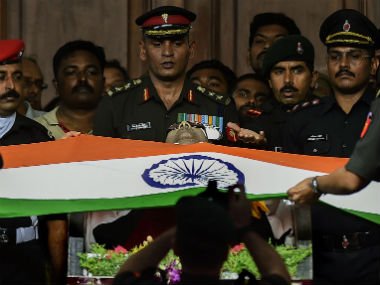Karunanidhi's burial at Marina Beach: BJP may end up paying the price for AIADMK's massive self-goal
There is no little amount of irony in the fact that a party that preaches rationalism, atheism and iconoclasm is desperate to secure for its departed leader a memorial for the ages. DMK's desperation to get a Marina Beach burial for Muthuvel Karunanidhi (1924-2018) and its deification of Kalaignar stands in stark contrast with its so-called anti-idolatry ideology.
Yet if the Dravidian ideologue is being imbued with a cultish aura and venerated as a demigod in death, the absurdity mirrors the confusion within the larger Dravidian Movement that has deviated from its egalitarian ideals and roots in cultural autonomy to emerge as a vehicle for Tamizh chauvinism, driven by an insecurity forged in the fire of identity politics.
The Dravidian Movement (that has its roots in the erstwhile Justice Party, founded in 1916 by around 30 non-Brahmanical leaders) has been vastly influential in shaping Dravidian identity, regional politics and even strengthening federalism in India.
However, for all the stress on “rationalism” and “atheism” espoused by founder EV Ramasamy (Periyar) and later handholding by CN Annadurai’s DMK (that gradually deviated from its demand for a separate Dravida Nadu to join the political mainstream), the Dravidian Movement could never rid the Tamizh society of its steadfast rootedness in theism.
It is here that we must seek the answers from the contradiction within DMK's ranks that teaches iconoclasm, yet seeks divinity for its leaders so that party workers, cadres and supporters can pay eternal homage. Politics, after all, is shaped by the society. A grasp of this reality is essential in understanding the controversy around a Marina Beach burial for the five-time Tamil Nadu chief minister who breathed his last on Tuesday at the age of 94.
M Karunanidhi passed away on Tuesday. PTIM Karunanidhi passed away on Tuesday. PTI
If DMK revealed the hollowness of its idealism in seeking a memorial for its departed patriarch, the AIADMK revealed its penchant for scoring own-goals in making a controversy out of it. The fact that the Madras High Court had to step in to act on a petition filed by the DMK at a special hearing and order the state government to permit the burial of Karunanidhi at Anna Square on Marina sands beside his mentor and former chief minister Annadurai, amounts to little more than political suicide for the ruling party.
Chief minister E Palaniswamy (EPS) and his deputy O Panneerselvam (OPS) should have realised that the act of rejecting DMK’s wish to lay Kalaignar to rest at Marina Beach (near the memorials of J Jayalalithaa and MGR) might be seen as a slight to Tamil Nadu’s tallest leader, a grave insult to his memory and trigger widespread popular outrage. If EPS and OPS failed to grasp the depth of the blunder, it could only be put down to their lack of political maturity.
In denying DMK's demand, the AIADMK government had cited rules of the Coastal Regulation Zone Act and stressed on the fact that Karunanidhi was a “former” chief minister, not a “sitting” one and therefore, unlike Jayalalithaa, did not merit a place at Anna Square. The death of a popular leader is an emotive issue. The ruling party's stance looked more like vendetta politics and pettiness over a deceased’s mortal remains instead of a rational position.
The AIADMK leadership perhaps failed to grasp the fact that the nonagenarian Kalaignar wasn’t just Tamil Nadu’s tallest leader butwas also one of the greatest influencers in Tamizh society and culture through his writings, films, poetry, not to speak of his contribution to the Dravidian cause over the course of a long political career spanning several decades.
He was also at the forefront of resisting ‘imperialism of northern India’ — always a sensitive issue in Tamizh politics. The Justice Party, father of the Dravidian Movement, received a boost in its political campaign back in 1937 “when the Madras Presidency government led by C. Rajagopalachari insisted on compulsory learning of Hindi in the State”, as Sruthisagar Yamunan writes in The Hindu.
‘Anti-Hindi’ sentiment and ‘resisting cultural imperialism of the north’ remained the keystones of DMK's politics. Karunanidhi's political career benefitted immensely in taking part in and shaping that fight. The Congress, for instance, scripted its own death in the state when in 1965, it tried to make Hindi the sole ‘official language’ of the country. It could never to return to power after being rejected by voters in 1967. This sentiment, closely tied with supremacy of Tamizh culture espoused by the Dravidian Movement, holds its relevance in regional politics.
This latest controversy, therefore, will obliquely harm even the BJP — which is seen as an unofficial ally of the AIADMK — and have wider implications for national politics beyond the confines of the state. To understand this, we need only take a look at the way the Congress and DMK are trying to set the battle lines